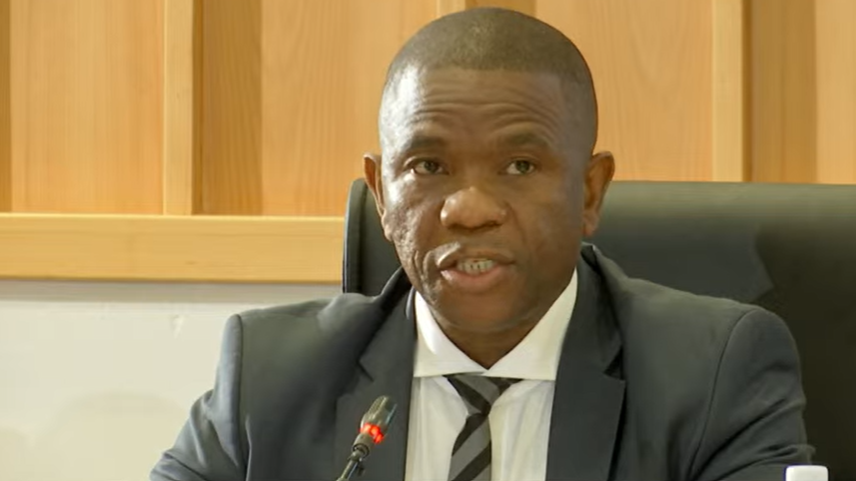Madlanga Commission Opens Hearings into Alleged Syndicate Capturing Justice System
The establishment of the commission stems from explosive allegations made by KwaZulu-Natal Police Commissioner Lieutenant General Nhlanhla Mkhwanazi.

- Country:
- South Africa
The Madlanga Commission begins its highly anticipated hearings in Tshwane today, marking the start of what has been described by President Cyril Ramaphosa as a mission of national urgency. Officially known as the Judicial Commission of Inquiry into Criminality, Political Interference and Corruption in the Criminal Justice System, the inquiry is chaired by Constitutional Court Justice Mbuyiseli Madlanga and is tasked with unearthing the extent of alleged criminal infiltration within South Africa’s law enforcement and prosecutorial institutions.
Allegations that Shook the Nation
The establishment of the commission stems from explosive allegations made by KwaZulu-Natal Police Commissioner Lieutenant General Nhlanhla Mkhwanazi. In a startling media briefing earlier this year, Mkhwanazi claimed that a powerful criminal syndicate has infiltrated the South African Police Service (SAPS), the National Prosecuting Authority (NPA), intelligence structures, and even sections of the judiciary. He further accused Police Minister Senzo Mchunu of colluding with criminal elements to disband the Political Killings Task Team in KwaZulu-Natal—a move that allegedly allowed political violence to persist unchecked.
These claims raised alarm bells across the nation, prompting President Ramaphosa to announce the commission in a nationally televised address. He warned that the allegations, if substantiated, posed “a grave threat to the Constitution, the rule of law, and national security.”
Opening Proceedings in Tshwane
Today’s hearings are taking place at the Brigitte Mabandla Justice College auditorium in Tshwane. Commission spokesperson Jeremy Michaels confirmed that the first session will begin at 10am, with proceedings from Thursday scheduled to start at 9:30am. Access is strictly controlled, with seating on a first-come, first-served basis. Public entry is through the Struben Street entrance, although parking at the venue is limited.
The first witness expected to testify is Lieutenant General Mkhwanazi himself. Commission evidence leaders and investigators have been consulting with him and other witnesses in recent weeks, preparing the groundwork for what is likely to be an explosive testimony.
Balancing Transparency and Safety
While the Zondo Commission into state capture set a precedent for public transparency, the Madlanga Commission faces a more precarious challenge: protecting lives. Advocate Matthew Chaskalson SC, leading the commission’s evidence team, has confirmed that some testimonies may not be given in public to shield witnesses from intimidation or harm.
“Transparency is important, but not at the expense of human life,” Chaskalson emphasised. “We are dealing with organised criminal networks that pose a direct risk to those willing to speak out. Protecting them is our first priority.”
Scope of the Inquiry
The commission’s terms of reference are wide-ranging and include investigating:
-
The facilitation of organised crime through state structures.
-
Suppression or manipulation of criminal investigations.
-
Inducements or coercion of law enforcement leadership into unlawful actions.
-
The targeting, intimidation, or removal of whistleblowers and officials resisting corruption.
Institutions under scrutiny include the SAPS, NPA, State Security Agency, Judiciary, Magistracy, and metropolitan police departments in Johannesburg, Tshwane, and Ekurhuleni. The commission will also probe whether senior members of the National Executive responsible for the justice system were complicit or benefitted from the alleged criminal network.
Presidential Mandate and Powers
President Ramaphosa has given the commission significant powers, including the ability to refer matters for immediate criminal investigation and urgent prosecution. Interim reports are expected within three and six months, with the final report due to be submitted to the President, the Speaker of the National Assembly, and the Chief Justice.
The President stressed that while the inquiry proceeds, law enforcement agencies must remain focused on their duties. “South Africans must continue to feel protected, and the rule of law must not falter during this process,” he said.
Public Trust and National Security
The establishment of the Madlanga Commission is as much about truth-finding as it is about restoring public confidence. Years of rising crime, allegations of police corruption, and political interference have shaken citizens’ faith in the justice system. By confronting these issues head-on, the government hopes to reassure South Africans that no one is above the law.
President Ramaphosa appealed to the public for support: “This commission is an affirmation of our commitment to accountability and the rule of law. I urge all South Africans to assist where possible, and to trust that this process will help safeguard our democracy and rebuild institutions that serve the people.”
The hearings are expected to run for several months, with witnesses ranging from whistleblowers and senior officials to ordinary citizens caught up in the web of corruption. For many, today’s opening session represents a turning point—an opportunity to expose the forces undermining South Africa’s criminal justice system and to begin charting a path toward institutional renewal.








